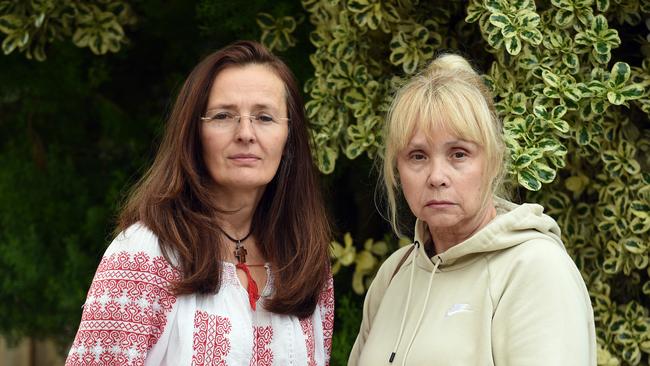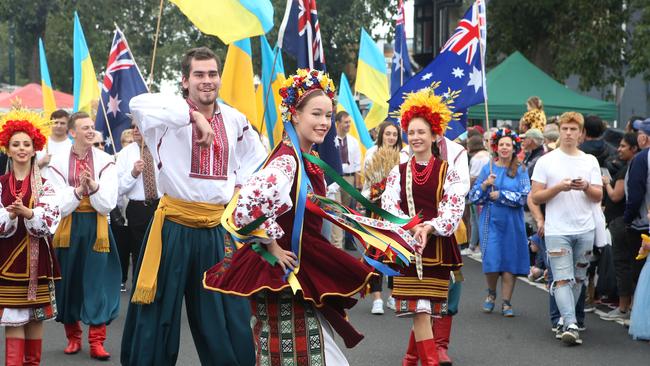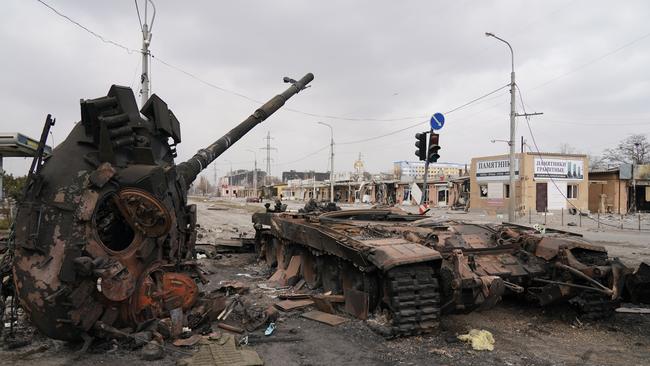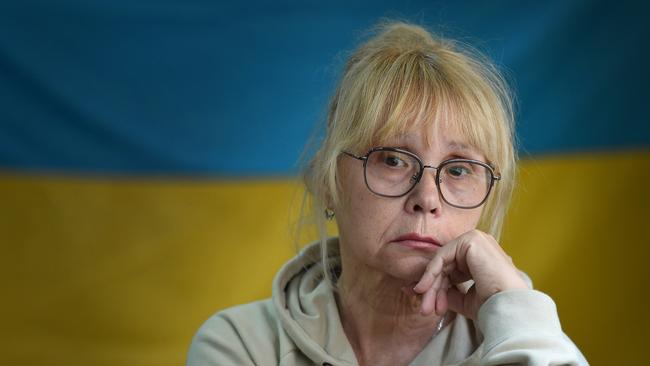Displaced Ukrainian grandmother shares heartache: How you can help displaced families
As Ukrainian families flee their war-torn country for safety in Australia, support groups are turning to the community for help.
Geelong
Don't miss out on the headlines from Geelong. Followed categories will be added to My News.
Geelong’s Ukrainian community is seeking assistance to help welcome displaced people arriving from the war-torn country.
The Association of Ukrainians in Victoria Geelong branch says it knows of five displaced Ukrainian families with members in the area, with another six expected to arrive next week.
Branch committee member Nadia Tkaczuk said the new arrivals had experienced major trauma.

The Geelong branch is working to prepare up to 50 welcome packs for families who may need them, with contributions from the community.
It is seeking donated vouchers (food/supermarket, retail, clothing, pharmaceutical); personal electronic devices and technology (mobile phones, iPads, dongles, SIM cards); and bags / storage containers for packing.
Is currently not accepting second-hand items for anything except electronics.
A Home Affairs Department spokesman said the department was progressing visa applications from Ukrainian nationals as a priority, particularly for those with a connection to Australia.

The spokesman said since February 23, the department had granted more than 6000, mostly temporary, visas to Ukrainians in Ukraine and hundreds more to Ukrainians elsewhere.
More than 1600 of these visa holders have arrived in Australia and more arrive every day.
“Ukrainian nationals who have arrived on a temporary visa, and wish to extend their stay in Australia, can seek information about visa options visa our online inquiry form,” the spokesman said.
They said that on March 20, the Prime Minister and Immigration Minister announced that the government would make available a temporary humanitarian visa to Ukrainians forced to flee from Russia’s military invasion, and who have arrived in Australia.
“This visa will be valid for three years and allow people to work, study and access Medicare,” the spokesman said.
“The department will provide further advice to support the transition of eligible and interested Ukrainians onto a temporary (humanitarian concern) visa in due course.
“Further, the government will work closely with the Ukrainian community to ensure permanent visa options are made available to this cohort at an appropriate time.”
Donations can be dropped at the Ukrainian hall at 57 Pakington St between the hours of 4-6pm Monday to Friday.
People can contact the association branch to discuss their donation and pick-ups may be arranged where practicable.
Questions about assisting new arrivals can be directed to Mrs Tkaczuk on 0467 711 130.
For updates on local fundraising efforts and initiatives, visit the Ukrainians in Geelong Facebook page.
People can volunteer to host a displaced person or offer services (such as legal or medical) at:
ukrainians.org.au/i-would-like-to-help/
Displaced Ukrainian grandmother shares heartache
Since Liudmyla Skoryk arrived in Australia two months ago, her home has been destroyed, her city bombed, and her loved ones forced to flee across Ukraine.
The 65-year-old retired journalist came to Australia on February 9 to see her adult daughter in Geelong.
Mrs Skoryk is from Mariupol, a besieged port city in southeastern Ukraine which came under heavy fire after Russia launched its invasion on February 24.
Speaking to the Addy through a translator, Mrs Skoryk said before she left for Australia, there was starting to be a feeling of something serious occurring, and blasts could already be heard.

She said there had been military presence in the Mariupol for years, with the city on alert since Russia annexed Crimea in 2014.
Mrs Skoryk’s husband, 63, and son, 37, stayed behind in Ukraine.
They spent three weeks in bunkers in freezing conditions, and were only able to communicate after emerging from a shelter after 15 days before moving to another nearby.
Mariupol’s mayor warned the city, where a fatal bombing on a maternity hospital shocked people around the world, was running out of food.
Mrs Skoryk’s son and husband travelled across Ukraine in the same convoy, which came under fire.
Her husband is currently with his family in a town in central Ukraine.
While telecommunication towers and infrastructure in that town have been attacked, it is safer than Mariupol.
Her son is near the Hungarian border, recovering from surgery after he injured his back following the invasion.

Ukrainian men aged between 18 and 60 have been restricted from leaving the country.
Mrs Skoryk’s 9-year-old grandson has escaped to Germany with his mother.
Asked about her future – whether she hopes to return to Ukraine or would like to see her family come to Australia – Mrs Skoryk finds it too hard to answer.
She does not know how the situation will unfold.
Her home was destroyed by bombing.
Thinking about her family back in Ukraine makes her shake with anxiety.
During the day, she copes, but at night, when she communicates with friends and family in Ukraine due to the time difference, she struggles.

Mrs Skoryk said her daughter, who was contacting family and friends from Australia and arranging convoys and sending money, is equally traumatised.
Mrs Skoryk said while Ukrainians had always expected unrest, they did not realise the scale of the invasion that would take place.
Since the invasion began, people she knows have died,and it is hard to keep track who remains in bunkers.
In Geelong, Mrs Skoryk has been able to connect with the local Ukrainian community, who is looking to help set her up with work, which could help support her family back in Ukraine.
“My heart is with Ukraine,” she said.
Originally published as Displaced Ukrainian grandmother shares heartache: How you can help displaced families





